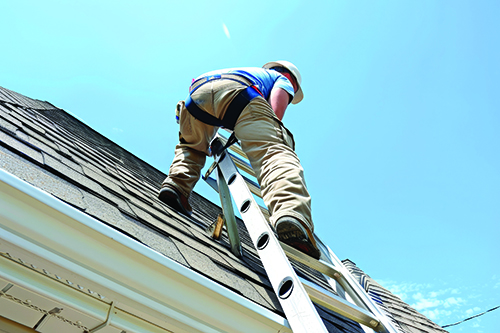A modular project needs coverage that a traditional build doesn’t. But that coverage isn’t always easy to get.
- Although modular is a proven construction method, insurers who have only worked with conventional builders may be hesitant to provide coverage.
- Make sure the modules are adequately insured while in the factory, as well as during transport and assembly, and that coverage limits are sufficient.
- Often, the key to getting insurance is to start with a small project in order to build a track record. Then, the policy can grow with you.
Every construction project, regardless of size, must be insured. Insurance coverage is crucial because it protects properties, equipment and crew members, and shields responsible parties from significant financial losses. Moving forward without adequate insurance is just asking for financial ruin.
Most contractors understand the importance of insurance coverage, and most have had no issue securing it for their projects. Until their first modular project, that is. Coverage may not be as easy to get as on a conventional build, despite it being just as critical, if not more so.
Even though modular has proven itself over decades, a lot of insurers are still unfamiliar with it, and that unfamiliarity can breed hesitation. “One of the biggest challenges is that modular is [considered] atypical, so insurance companies don’t know what to do with it,” says attorney Jevon Bindman, a partner and construction, real estate and insurance litigator at Maslon LLP in Minneapolis. “I think there’s a stigma where some insurance companies think modular means ‘manufactured,’ like a manufactured home. But of course, that’s not an accurate comparison.”

Differences from conventional
Bindman said that one reason insurance companies are hesitant to provide coverage for modular, is the fact that the modules aren’t built on site. When large portions of a project are assembled at a manufacturing facility that could be hundreds of miles away from where they ultimately will be located.
The manufacturer’s insurance will likely cover damage to the units, but not compensation for delays caused by that damage. Although the contractor should look at insurance to cover the gaps, there’s a need for caution. “There are potential issues of which policy is primary, and there are exclusions that could apply to the manufacturer’s policy but not the contractor’s,” according to Bindman. He says those considerations are very fact-specific so it’s hard to generalize.

Another unique risk with modular is transportation and assembly, according to Sholley, commercial insurance agent and owner of Sholley Insurance Agency in Central Pennsylvania. These risks include potential damage while transporting modules over the road or during assembly.

Bindman points out that similar caveats apply to transport as to manufacturing. Entire units—including the structure, the finishes, and the electrical and mechanical systems—need to be insured while being moved over the road. “The transport company should have coverage,” he says, although he points out that it’s important to confirm the coverage. “But the bigger concern is damages stemming from construction delays [caused by modules damaged in transit]. The transport company probably will only cover replacement costs but not delays.”

The contractor also needs to have a clear understanding of sublimits—i.e. the maximum amount an insurer will pay for specific claims. “Insurance contracts often have a sublimit for transportation, so make sure that the sublimit provides sufficient coverage.”
Other needs
In addition to the modular-specific coverages mentioned above, builders and contractors will typically use the same insurance products that those running a traditional project would. They include general liability insurance, which protects against third-party lawsuits for property damage or bodily injury, as well as professional negligence claims for construction or defects.

Many states mandate workers’ compensation insurance for medical expenses and lost wages for employees who are injured on the job. Umbrella insurance is worth considering because it provides liability coverage beyond the limits of other insurance policies and helps in cases where a claim exceeds the limits of the primary policies. Meanwhile, builder’s risk coverage protects against property damage to the construction project itself.
Subcontractors need insurance, too. “Contractors should ensure that subs carry adequate insurance coverage, such as general liability and workers’ compensation,” Sholley said. “They should require their subcontractors to list the contractor as additional insured and to add waiver of subrogation to their subcontractors insurance policies.” The waiver prevents the sub’s insurance company from suing other parties on the project (such as the contractor) in an attempt to recover payments made against claims.

While cybersecurity probably isn’t often connected with construction, Sholley recommends getting cyber liability insurance for modular projects. “In today’s digital age, contractors may need coverage for data breaches, cyberattacks, or other cyber-related risks, especially if they store sensitive client information or rely on digital systems for project management,” he said.
All of the above is about putting together an effective package. “You have a combination of insurance products,” Bindman said. “Each protects against different risks.”
Counting the costs
Surprisingly, many contractors and subcontractors start projects with inadequate insurance because they don’t review their coverages often enough. “It’s important to look at their coverage limits once every couple of years to make sure they are still within the normal bounds. A good insurance broker can help with that for sure,” Bindman said, “This is especially true for modular construction. Make sure the modular manufacturer’s policy includes your company as an additional insured in case anything happens.”
High pricing could be why so many contractors go into a modular or offsite project without enough insurance. Insurance for modular projects is priced higher than for traditional construction because of insurers unfamiliarity with this type of construction.
That’s is unfortunate, according to Bindman, because the risk is not as big as insurers think it is. “In a lot of ways, modular builds are less risky because word is done in a climate-controlled facility with a properly trained staff and employees,” he said. “Insurance companies should be viewing modular as a really good risk, but a lot of times the premiums haven’t borne that out.”
While modular insurance policies can be expensive, the alternative is not having coverage at all. But as modular projects grow larger in size, the number of insurance companies willing to cover them shrinks. “In some states [getting coverage] has become almost impossible,” Bindman said.
In addition, modular’s more complex supply chain can make insurers hesitant. “Modular construction often involves multiple parties across different stages of the project, including design, manufacturing, transportation, and assembly,” Sholley said. “This complex supply chain can introduce additional risks and uncertainties, making it more difficult for insurers to assess and mitigate potential liabilities.”
The difficulty of getting coverage has forced many project owners to self-insure. That’s an unenviable position because all risk falls on the project owner, and any third-party liability charges have to be paid out of pocket. “[Self-insuring] isn’t something a company can do over and over again because they’d be tying up so much of their revenue,” Bindman said. “If you’re able to find a product or broker that’s willing to work with you, it makes a huge difference.”
Builders and contractors can also benefit by having self-awareness about their current standing. For example, a company that’s new to modular will have an easier time getting coverage if they don’t bite off too much. Rather than looking to build a $50 million project, start small and move up gradually.

Closing advice
Securing insurance for modular projects can be difficult, but it’s not impossible. The key is to start looking for coverage early and to be proactive. Ask brokers to get provisions such as having the manufacturing facility included as part of the covered property, and ask them to increase the transportation coverage sublimit to a sufficient amount.
Additionally, general contractors should engage their manufacturer early on to confirm that they have enough coverage and that the general contractor is listed as an additional insured. “That will help with a lot of these issues and make sure that if something does go wrong, that you have the necessary coverage to weather the storm,” Bindman said.
When it doubt, it does not hurt to have another set of eyes look at any insurance policy — especially for exclusions, which can be confusing or misinterpreted.
“It’s worthwhile if you’re heading into this area to have an insurance coverage attorney just take a look, and it can at least flag the exclusions that come up fairly often,” Bindman said. “[That way] you can talk through them and make sure you understand how to avoid those exclusions applying or how to put yourself in as good of a light as possible so that exclusion doesn’t come into play.”
Joe Dyton has been a professional writer since 1999. His work has appeared in Connected Real Estate Magazine, American Builders Quarterly, USA Today, Credit Karma and U.S. News & World Report.







